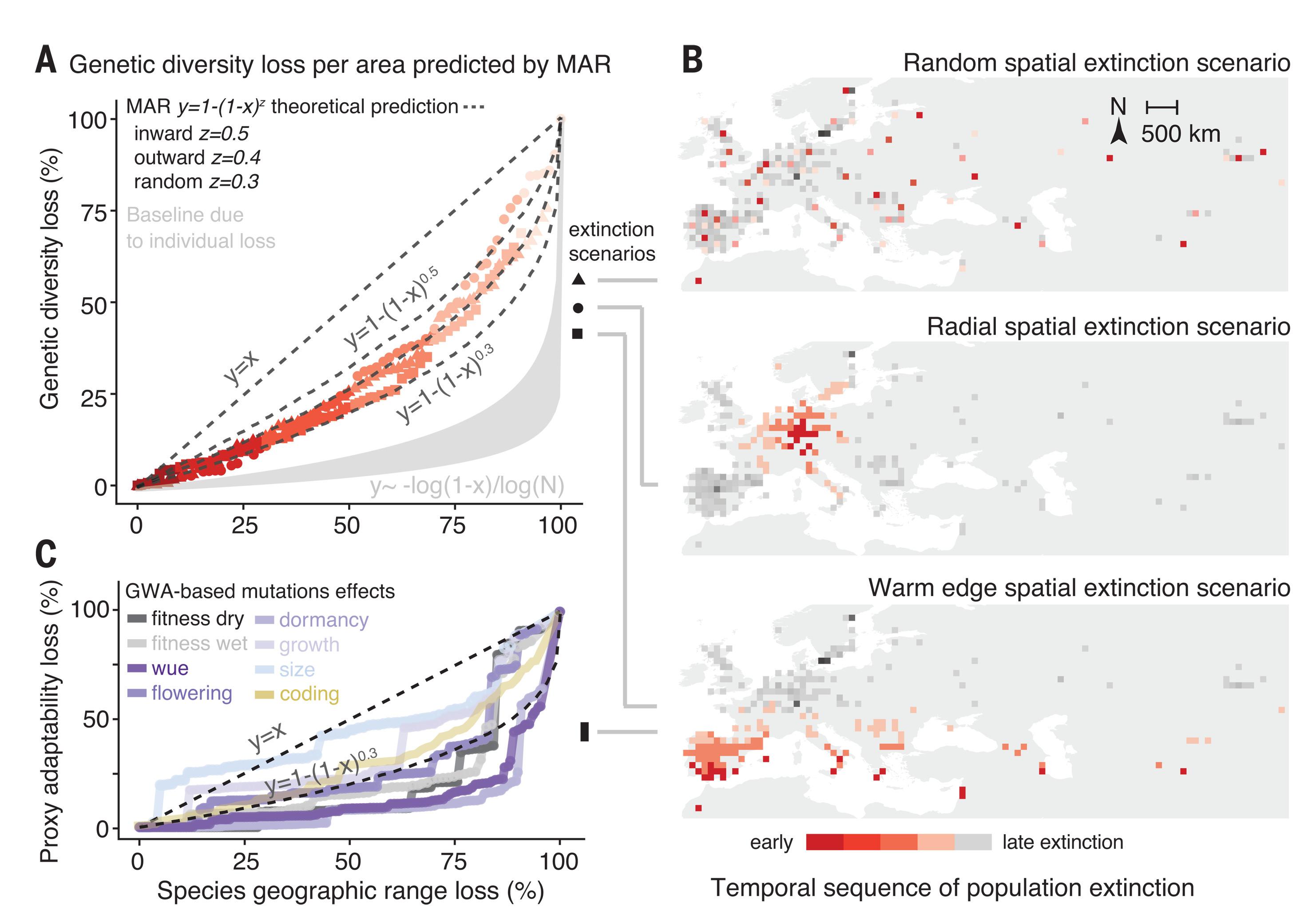Genetic diversity loss in the Anthropocene
IF 45.8
1区 综合性期刊
Q1 MULTIDISCIPLINARY SCIENCES
引用次数: 48
Abstract
Anthropogenic habitat loss and climate change are reducing species’ geographic ranges, increasing extinction risk and losses of species’ genetic diversity. Although preserving genetic diversity is key to maintaining species’ adaptability, we lack predictive tools and global estimates of genetic diversity loss across ecosystems. We introduce a mathematical framework that bridges biodiversity theory and population genetics to understand the loss of naturally occurring DNA mutations with decreasing habitat. By analyzing genomic variation of 10,095 georeferenced individuals from 20 plant and animal species, we show that genome-wide diversity follows a mutations-area relationship power law with geographic area, which can predict genetic diversity loss from local population extinctions. We estimate that more than 10% of genetic diversity may already be lost for many threatened and nonthreatened species, surpassing the United Nations’ post-2020 targets for genetic preservation.

人类世遗传多样性的丧失
人类活动造成的栖息地丧失和气候变化正在缩小物种的地理分布范围,增加了物种灭绝的风险和遗传多样性的损失。虽然保护遗传多样性是保持物种适应性的关键,但我们缺乏预测工具和对生态系统遗传多样性损失的全球估计。我们引入了一个数学框架,将生物多样性理论与群体遗传学联系起来,以了解随着栖息地的减少,自然发生的 DNA 变异的损失情况。通过分析来自 20 个动植物物种的 10,095 个地理参照个体的基因组变异,我们发现整个基因组的多样性与地理区域的突变-区域关系呈幂律关系,这可以预测局部种群灭绝造成的遗传多样性损失。我们估计,许多濒危和非濒危物种的遗传多样性可能已经丧失了 10%以上,超过了联合国提出的 2020 年后遗传保护目标。
本文章由计算机程序翻译,如有差异,请以英文原文为准。
求助全文
约1分钟内获得全文
求助全文
来源期刊

Science
综合性期刊-综合性期刊
CiteScore
61.10
自引率
0.90%
发文量
0
审稿时长
2.1 months
期刊介绍:
Science is a leading outlet for scientific news, commentary, and cutting-edge research. Through its print and online incarnations, Science reaches an estimated worldwide readership of more than one million. Science’s authorship is global too, and its articles consistently rank among the world's most cited research.
Science serves as a forum for discussion of important issues related to the advancement of science by publishing material on which a consensus has been reached as well as including the presentation of minority or conflicting points of view. Accordingly, all articles published in Science—including editorials, news and comment, and book reviews—are signed and reflect the individual views of the authors and not official points of view adopted by AAAS or the institutions with which the authors are affiliated.
Science seeks to publish those papers that are most influential in their fields or across fields and that will significantly advance scientific understanding. Selected papers should present novel and broadly important data, syntheses, or concepts. They should merit recognition by the wider scientific community and general public provided by publication in Science, beyond that provided by specialty journals. Science welcomes submissions from all fields of science and from any source. The editors are committed to the prompt evaluation and publication of submitted papers while upholding high standards that support reproducibility of published research. Science is published weekly; selected papers are published online ahead of print.
 求助内容:
求助内容: 应助结果提醒方式:
应助结果提醒方式:


